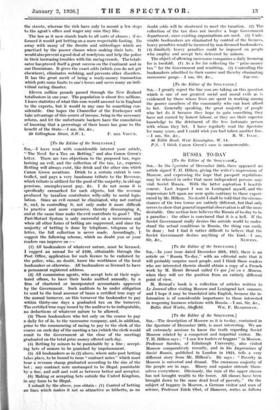[To the Editor of the SPECTATOR.] SIR,—I have read with
considerable interest your article, "The Need for a Tax on Betting," and also Canon Green's letter. There are two objections to the proposed tax, regu- larizing an evil, and the collection of the tax, i.e., expense. Betting will always exist, like drink and the other sins which Canon Green mentions. Drink to a certain extent is con- trolled, and pays a very handsome tribute to the Revenue, which tribute is utilized for the good of the majority, in old-age pensions, unemployment pay, &c. I do not mean it is specifically earmarked for such objects, but the revenue produced by taxation contributes willy-nilly to social legis-
lation. Since an evil cannot be eliminated, why not control _
it, 1 and, in controlling it, not only make it more difficult to practise and more expensive, thereby discouraging it, and at the same time make the evil contribute to good ? The PariMutuel System is only successful on a racecourse and when all other forms of betting are suppressed, and since the majority of betting is done by telephone, telegram or by letter, the full collection is never made. Accordingly, I suggest the following scheme, which no doubt you or your readers can improve on :- (1) All bookmakers of whatever nature, mint be licensed. I suggest an annual fee of £100, obtainable through the Post Office, application for such licence to be endorsed by the police, who, no doubt, know the worthiness of the local bookmaker or otherwise. All bookmakers so licensed to have a permanent registered address.
(2) All commission agents, who accept bets at their regis- tered offices, to have their books audited annually, by a firm of chartered or incorporated accountants approved by the Government. Such auditors to be under obligation to send to the local assessor of taxes a certified true copy of the annual turnover, on this turnover the bookmaker to pay within thirty-one days a graduated tax on the turnover. The certified true copy issued by the auditor to be indisputable, no deductions of -whatever nature to be allowed.
(3) Those bookmakers who bet only on the course to pay a daily, fee of 5s. to the racecourse company, and, in addition, prior to the commencing of racing to pay to the clerk of the course on each day of the meeting a tax (which the clerk would remit to the Government at the close of the meeting) graduated on the total prize money offered each day.
(4) Betting by minors to be punishable by a fine ; accept- ing bets of minors to be punished by imprisonment.
(5) All bookmakers as in (2) above, where ante-post betting Lakes place, to be bound to issue !•` contract notes" which must bear a revenue stamp graduated according to the size of the bet.; any contract note tmstarnped to be illegal, punishable by a fine, and null and void as between bettor and acceptor. _ (6) Making or accepting bets outside the United Kingdom, in any form to be illegal.
I submit by the above, you obtain : (1) Control of betting on lines which makes it not so attractive as hitherto, as no doubt odds will be shortened to meet the taxation. (2) The collection of the tax does not involve a huge Government department, since existing organizations are used. (3) Unde- sirable bookmakers are eliminated by control of the licences, heavy penalties would be incurred by non-licensed bookmakers. (4) Similarly. heavy penalties could be imposed on people who employ and accept bets delivered by minors.
The object of allowing racecourse companies a daily licensing fee is twofold. (1) As a fee for collecting the "prize-money tax" for the Government and remitting. (2) Controlling the bookmakers admitted to their course and thereby eliminating racecourse gangs.—I am, Sir, &c., EQUINE.










































 Previous page
Previous page